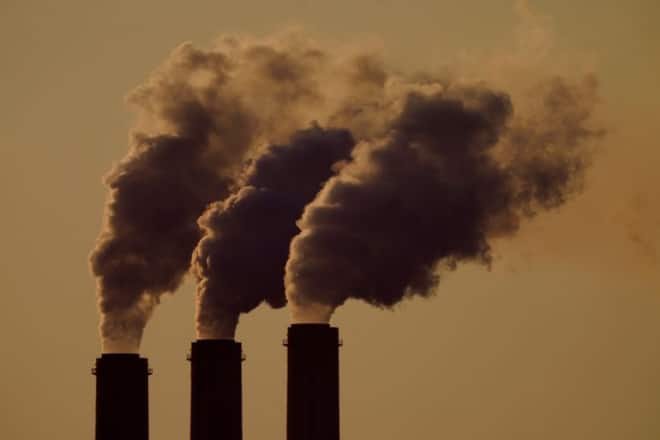The interesting thing about the ecological economist Nicholas Georgescu-Roegen’s application of the entropy law, for Marxists, is that it explains something about Marx’s theory of metabolic rift.
Metabolic analysis of human society developed alongside ecological economics and is now the established science of material flow analysis. It is due in part to the efforts of these scientists that statistics on CO2 emissions and other wastes are readily available and subject of public debate. Ecologist Marina Fisher-Kowalski credits Marx and Engels as the founders of this school which has produced prolific literature and empirical data since the 1960s (Industrial Metabolism, 1998).
Fisher-Kowalski notes the use of the term metabolism to describe ecosystem-scale or even planetary material flows is not uncontroversial:
whereas the concept of metabolism is widely applied at the interface of biochemistry and biology when referring to cells, organs, and organisms in biology, it appears to be a matter of dispute about whether to use this term further up the biological hierarchy… the contested point is whether there exist any controls, information-mediated feedback cycles, or evolutionary mechanisms working on the systems level as such.
What is not is in dispute and is common ground between energy/ material flow analysis, ecological economics and ecological Marxism is that that “the economic process, like any other life process, is irreversible (and irrevocably so); hence it cannot be explained by dynamics alone. It is thermodynamics, through the Entropy law, that recognises the qualitative distinction which economists should have recognised at the outset between the inputs of valuable resources (low entropy) and the final outputs of valueless waste.” (Energy and Economic Myths, Georgescu-Roegen).
Common Ground
Paul Vernadsky’s claim that there is no common ground here is wrong. The evidence of this common ground can be found throughout the work of Burkett and the other metabolic rift theorists, and in the mature works of Marx and Engels. The common ground exists because it is firmly rooted in material reality.
Paul invokes the sun as proof that “entropy is insignficant for the ecological crisis” as if he has just discovered something that has been overlooked by 50 years of ecological science. Zack Muddle (Solidarity 673) also thinks the existence of the sun was overlooked by the ecological economists.
This is a misunderstanding. Georgescu-Roegen writes on how “the sun radiates annually [a] fantastic flow… only [a small part is] intercepted at the limits of the earth’s atmosphere, with roughly one half of that amount being reflected back into outer space… The total world consumption of energy currently amounts to no more than [a fraction]. From the solar energy that reaches ground level, photosynthesis absorbs only [a fraction].”
The human social metabolism is in open dissipative system situated within the open dissipative system of the biosphere. Solar energy, mostly via green plants and trophic cascade, creates low entropy terrestrial stocks of solar energy on Earth. We also draw directly on low entropy flows of solar radiation.
The stocks we find in our environment are largely products of living organisms that have already fed off low entropy solar energy: food, fossil fuels, mineral deposits, timber. The issue that the ecological economists are concerned with is how human society sustains itself and grows by drawing on the low entropy stocks produced by the biosphere as well as directly tapping the low entropy flows from solar radiation. By squandering low entropy stocks capitalist society has broken “the budget constraint of living on solar income” (Herman Daly).
Georgescu-Roegen’s “gloomy pessimism” is due to the fact that he sees the entropy producing practices of the capitalist social metabolism as something inherent in the human condition.
Green plants store part of the solar radiation which in their absence would immediately go into dissipated heat, into high entropy. That is why we can burn now the solar energy saved from degradation millions of years ago in the form of coal or a few years ago in the form of a tree. All other organisms, on the contrary, speed up the march of entropy. Man [sic] occupies the highest position on this scale, and this is all that environmental issues are about. (Energy and Economic Myths)
While this is no doubt true in the abstract, it is also true that the speed of entropy production could be significantly reduced by a more careful, planned, ecologically sensitive organisation of human labour. Such an approach is precluded by the incessant pursuit of profit. This is the point of departure for Marxists and ecological economics. The secular trend to increase labour productivity means ever increasing material throughput per labour hour. The social metabolism under capitalism is a blind, fossil-fuelled acceleration of the materials of the earth into ecological crisis.
Planetary boundaries
Paul doubts entropy has any significance to ecological crisis. But accelerating entropic degradation is driving us beyond all planetary boundaries. Rising levels of high entropy atmospheric CO2 and other greenhouse gases are driving climate change and ocean acidification. Rising levels of high-entropy fertiliser and sewage run-off are driving hypoxic deadzones. Rising volumes of high-entropy biocidal novel chemicals are causing biodiversity loss and human health problems. The ever-expanding frontier of primary industry is destroying biodiverse wilderness.
Far from being “insignificant”, capitalism’s accelerating entropic degradation is the tap root of all anthropogenic ecological crises, creating an “irreparable rift in the interdependent process between social metabolism and natural metabolism” (Marx).
There are other ways to approach and understand metabolic rift theory that will be explored in further reading groups.

